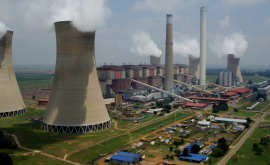
Chairman of the Management Committee National Rationalised Specifications (NRS) Association of South Africa, Vally Padayachee, says the country remains very distant from an electrical blackout even in the face of higher stages of load shedding.
Padayachee was speaking at the National Press Club on Wednesday morning.
“To give assurance to the media and the public that migrating into a blackout situation and a potential national grid collapse though technically is not impossible but it is virtually not probable at all.
“After all … it has not happened in South Africa to date in 100 years of Eskom’s existence … we have never had a total blackout in the country. So hence we can give you the assurance that we’re still far away from a blackout let alone a grid collapse,” he said.
Padayachee carefully explained how electricity blackouts are caused.
“It’s caused by an unexpected and sudden event in the transmission network that cascades and eventually results in generators protecting themselves and separating from the network.
“When we get to the situation where the supply cannot meet the demand, the system automatically takes over and it would get into a blackout situation. There are a number of interventions for that which prevents that from happening. Blackouts are not only caused by a lack of generation capacity - it could be caused by other [factors],” he said.
He further emphasised that even as higher stages of load shedding are implemented, this does not automatically bring a potential for a blackout.
“The Eskom System Operator does have plans and they test the plans regularly … they get audited by NERSA as well.
“It is very important also that higher stages of load shedding does not mean we get closer to a blackout. Load shedding … is an excellent management tool to prevent us from getting closer to a blackout or to a grid collapse.
“So it means our electricity utility members, especially Eskom, are in control of the network and are keeping it stable. Although I must admit that load shedding is not a panacea, it still causes a lot of inconvenience and impacts the economy,” he said.
Preparing for higher stages
Padayachee said even though a system blackout is highly unlikely, the NRS with NERSA is developing a document – NRS 048-9 Edition 3 – which will legally provide for load shedding up to Stage 16 – not in anticipation but to allow the power utility to prepare adequately should it be needed.
The document went through rigorous and extensive consultations with over 100 comments from organisations and people.
“As the NRS we wish to reiterate and assure the public the need to plan for a potential load shedding Stage 8 up to and including load shedding at possible elevated levels and the unlikely event up to Stage 16 … is primarily a proactive measure as a responsible organisation to enable or empower the various utilities – especially Eskom – to be in a maximum state of readiness and preparedness to respond in the event of and the need to, hopefully not, institute load shedding beyond Stage 8.
“It does not mean that the reference to Stage 16 in the NRS 048-9 Edition 3 is now a fait accompli that the electricity utilities are planning to migrate to Stage 16 load shedding. It is definitely not the case,” he said. – SAnews.gov.za


